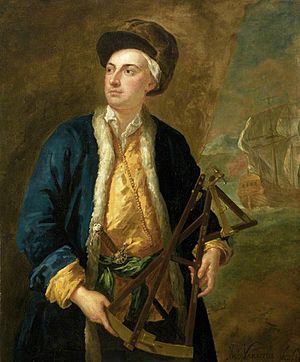John Elton facts for kids

John Elton (died 1751) was an English sea captain, shipbuilder, and merchant. He is most famous for inventing the Elton's quadrant. This was a special tool used for navigation at sea. He also worked for Nader Shah, who was the ruler (called a shah) of Iran at the time.
Contents
John Elton's Life and Adventures
His Amazing Invention
John Elton created a very important tool called the Elton's quadrant. He received a special patent for his design in 1728. This meant his invention was officially recognized. In 1732, he shared the details of his quadrant with the Royal Society. This was a famous group of scientists.
Exploring for Russia
In 1735, the Russian government asked John Elton for help. They sent him on an expedition to a place called Orenburg. He was a sea captain during this mission. His task was to explore Lake Aral, a large lake in Central Asia.
However, local groups called the Tartars stopped him. He could not reach the lake. After this, he spent time mapping out parts of Russia's southeastern border. He explored areas around the Kama, Volga, and Jaik rivers.
A New Business Idea
Elton returned to Saint Petersburg in January 1738. He was not happy because he didn't get a promotion. So, he decided to leave the Russian service. That same year, he came up with a new plan. He suggested to some British traders in St. Petersburg that they could trade with Iran and central Asia. This trade would happen by crossing Russia and using the Caspian Sea.
He teamed up with a young Scot named Mungo Graeme. They managed to get goods on credit. These goods were perfect for trading in places like Khiva and Bokhara. They left Moscow on March 19, 1739. They traveled down the Volga River to Astrakhan. From there, they sailed across the Caspian Sea.
Trading in Iran
When they reached Iran, Elton found a great market for their goods. He even got a special order from the shah. This order allowed them to trade freely all over Iran. It also gave them special rights. Elton convinced the Russia Company to join his plan. In 1741, a law was passed in Britain to support this trade.
In 1742, two ships were built on the Caspian Sea. Elton was put in charge of the first ship. These ships sailed under the English flag. However, the Russian court became worried. They heard that Elton was building European-style ships for the Iranian ruler, Nader Shah.
Working for Nader Shah
The Russia Company sent Jonas Hanway to find out what Elton was doing. Hanway arrived in Rasht in December 1743. He found Elton busy building Iranian ships. Russia was very upset with Elton's actions. They stopped supporting the Caspian Sea trade. This ruined the plans of the Russia Company.
Meanwhile, Elton had built a ship with twenty guns for Nader Shah. He was made the commander of this ship. He was also appointed the admiral of the Caspian Sea. He received orders to make all Russian ships salute his flag. During his time with Nader, he also moved supplies to Baku twice. He also mapped the southern coast of Dagestan. This was to prepare for Nader's military campaigns there.
His Final Years
In October 1744, the Russia Company told Elton to return to England. But Elton refused. He sent back an order from Nader Shah, dated November 19, 1745. This order forbade him from leaving Iran. The Russia Company offered him a pension. The British government offered him a job in the navy. But nothing worked.
Elton believed he could work for any friendly foreign ruler. He felt he owed nothing to Russia. After Nader Shah died in 1747, Elton faced danger. But several Iranian princes protected him. Finally, in April 1751, he supported Mohammad Hasan Khan Qajar. He was then surrounded in his house in Gilan by a rival group.
The governor of Gilan, Hajj Jamal Fumani, later took him prisoner. This was because Elton did not want to protect Rasht from the advancing Qajars. John Elton was later shot dead. A large part of Elton's diary from his first trip to Iran in 1739 was published. It can be found in Jonas Hanway's book, Historical Account of the British Trade over the Caspian Sea (1754). It is thought that Lake Elton in southeastern Russia is named after him.
Sources
 This article incorporates text from a publication now in the public domain: Carlyle, Edward Irving (1901). "Elton, John (d.1751)". Dictionary of National Biography (supplement). London: Smith, Elder & Co.
This article incorporates text from a publication now in the public domain: Carlyle, Edward Irving (1901). "Elton, John (d.1751)". Dictionary of National Biography (supplement). London: Smith, Elder & Co.
 | Ernest Everett Just |
 | Mary Jackson |
 | Emmett Chappelle |
 | Marie Maynard Daly |

